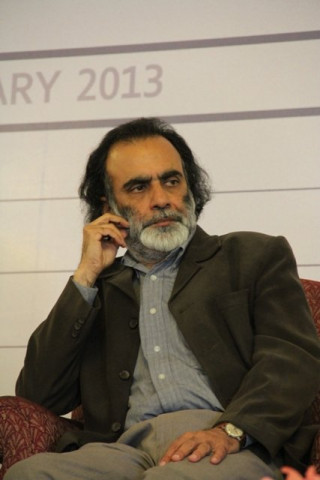Language barriers hinder learning in Pakistan, say experts
"Are children from either government or private sector schools getting a half way decent education?”

Writer Abbas Rashid at Karachi Literature Festival 2013. PHOTO: EXPRESS
“People say that private schools are winning the race in terms of education; but are children from either government or private sector schools getting a half way decent education?” This question, raised by writer and educator Abbas Rashid, was discussed at great length at a session titled ‘The State of Education in Pakistan’ on day two of the fourth Karachi Literature Festival.
The session opened with moderator Baela Raza Jamil, a director at Idara-e-Taleem-o-Aagahi, talking about the different languages spoken in Pakistan. A survey published last year by the Annual Status of Education Report (ASER) was shown to the audience. It reflected a percentage-based representation of the major and minor languages spoken in the country. Interestingly enough, 10 minutes into the session, a member of the audience requested that the talk be conducted in Urdu instead of English. The moderator apologised, and continued the rest of the session in Urdu. The panellists followed suit.
Well-known nuclear physicist Pervez Hoodbhoy, who was also part of the panel, agreed that language barriers can be a small problem when it comes to teaching. “I cannot translate the words ‘lambda’, ‘matrix’ and ‘electron’ into Urdu,” he said, as the audience giggled. “At Quaid-e-Azam University, I initially conducted lectures in English till I realised that the students looked perplexed. Then I switched to Urdu. In LUMS, however, students would stop me when I spoke in Urdu!”

Hoodbhoy then spoke about the more serious flaws of Pakistan’s current education system. “It makes children fall asleep. For this reason, students do not ask questions in a lecture at university level. Then there is this perception that you should ‘respect your teacher and never look him in the eye’ - you will not learn till your brain is working!”
He also said government policies that grant benefits and increments to professors who have the most published work to their credit are to be blamed for the “bad niyati” (wrong intentions) and “chori” (mischief) in our education system. He talked about how a professor at the Punjab University “whom everyone knows” bagged an early retirement and Dean’s position at another university simply by publishing work plagiarised from articles available online.
Panellist Ishrat Husain, the dean and director of the Institute of Business Administration, summed up the sentiment by saying, “Our country’s education system requires an all hands on deck approach. About 2.5 per cent of the budget is allocated to education but even that is utilised poorly.”
Published in The Express Tribune, February 17th, 2013.



















COMMENTS
Comments are moderated and generally will be posted if they are on-topic and not abusive.
For more information, please see our Comments FAQ